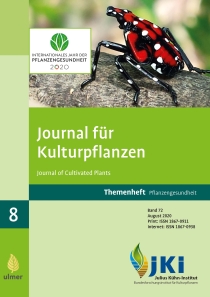The <em>in vitro</em> cultivation of <em>Bursaphelenchus</em> spp. at the reference laboratory for quarantine pests at Julius Kühn-Institut in Braunschweig
DOI:
https://doi.org/10.5073/JfK.2020.08.12Keywords:
Bursaphelenchus xylophilus, in vitro-breedingAbstract
The Forest quarantine laboratory at Julius Kühn-Institut in Braunschweig (Germany) curates a unique collection of living Bursaphelenchus species, permanent slides and ITS-RFLP profiles. The collection was initiated by Dr. Helen Braasch and currently comprises 48 species in 308 different isolates. These isolates were collected over 30 years across the globe from various habitats and sources, like forest trees and wood imports including wooden packaging material. Cultivation of the nematodes on sporulating and non-sporulating Botrytis cinerea is sophisticated, labor-intensive and requires both, experience and patience.
Downloads
Published
Issue
Section
License
The content of the journal is licensed under the Creative Commons Attribution 4.0 License. Any user is free to share and adapt (remix, transform, build upon) the content as long as the original publication is attributed (authors, title, year, journal, issue, pages).
The copyright of the published work remains with the authors. The authors grant the Journal of Cultivated Plants, the Julius Kühn-Institut and the OpenAgrar repository the non-exclusive right to distribute and exploit the work.







